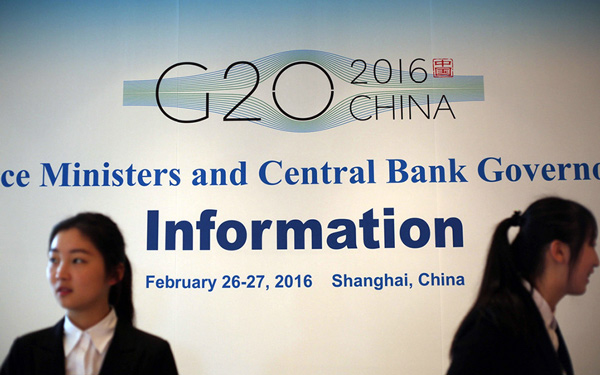Hangzhou can consolidate G20's transformation
Updated: 2016-08-13 10:37
By LI YANG(China Daily)
|
|||||||||
 |
|
Staff work at the information desk for the 2016 G20 Finance Ministers and Central Bank Governors Meeting at the Pudong Shangri-La East Shanghai hotel in Shanghai, Feb 24. [Photo/IC] |
New impetus to boost sustainable and balanced global growth, a hot topic at the G20 summits since the 2013 meeting in St Petersburg, has become an even more pressing issue now.
Last month, the International Monetary Fund lowered its forecast for global growth this year to 3.1 percent from 3.2 percent in April.
The United Kingdom's decision to leave the European Union is producing increasing political uncertainties, negatively affecting the confidence of investors worldwide.
And the emerging economies, which together have contributed more than 50 percent of world economic growth in recent years, are being pressured by external influences, such as the United States' macroeconomic and financial policy adjustments, as well as their own internal restructuring.
At their summit in Hangzhou in September, the leaders of the 20 major economies should "strive to build an innovative, invigorated, interconnected and inclusive global economy and explore new ways to drive development and structural reform", as Chinese President Xi Jinping said in a message to the G20 after China took over the rotating presidency.
Since it is the most important forum for cooperation among developed countries, emerging markets and developing countries, the G20 has to take the lead in advancing international economic cooperation by delivering concrete outcomes to foster strong, sustainable and balanced global growth.
Promoting innovation and interconnectivity and exploring new ways to sustainably drive development require joint actions, and Xi is expected to present a series of detailed proposals at the summit with the aim of achieving consensus on an implementable action plan.
At the heart of these will be the vision of a global community of shared destiny that Xi has previously proposed. China hopes to work with its G20 partners in the spirit of win-win cooperation to enhance exchanges and promote fairer global economic and financial governance, so as to address the inequality and imbalance in global development and ensure that the benefits of economic growth are more equitably shared among people of all countries.
Hangzhou, a city renowned for its rich history, is also known today for its innovation. So it is a fitting venue for seizing the historical opportunities brought about by the new industrial revolution and ushering in a new round of global growth.
China has lifted more than 700 million people out of poverty since the launch of its reform and opening-up in 1978, and it is restructuring its economy and improving its governance efficiency to ensure the sustainability of its growth so it can lift the remaining 70 million people out of poverty by 2020.
Despite the downward pressure on the Chinese economy in recent years, it still has considerable potential for growth, and will continue to be a driver of the global economy.
Since it was set up at the height of the international financial crisis in 2008, the G20 has demonstrated that in a world of deepening economic interconnection, cooperation is the way for countries to meet challenges and achieve common development.
The Hangzhou summit is the opportunity for the G20 to consolidate its transformation from a crisis-response mechanism to the primary forum for long-term global economic governance. China will work together with the other participants at the G20 summit to strengthen communication and coordination to address the critical issues affecting the global economy and forge interconnected and inclusive development that will benefit all.
The author is a writer of China Daily. liyang@chinadaily.com.cn
Related Stories
What's being about the upcoming G20 summit? 2016-08-13 09:51
Hangzhou can consolidate G20's transformation 2016-08-13 07:36
What's being said about China's role at the upcoming G20 summit 2016-08-11 10:38
G20 golden chance to lead on development 2016-08-11 08:09
Today's Top News
Chinese investment in European football
Myanmar's Suu Kyi to visit Beijing
Ukraine denies attempted troop invasion of Crimea
Solidarity called to firefighters facing wildfires
Eurostar train staff to strike for seven days: UK union
Trump's gun rights comments ignite firestorm
China consumer prices up 1.8% in July
Video introduces G20 city Hangzhou to Europe
Hot Topics
Lunar probe , China growth forecasts, Emission rules get tougher, China seen through 'colored lens', International board,
Editor's Picks

|

|

|

|

|

|







